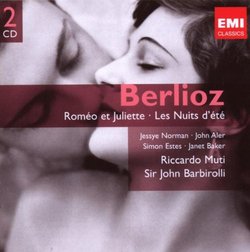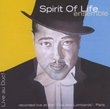| All Artists: Riccardo Muti Title: Berlioz: Romeo and Juliet Members Wishing: 0 Total Copies: 0 Label: EMI Classics Original Release Date: 1/1/2008 Re-Release Date: 11/11/2008 Genres: Pop, Classical Styles: Vocal Pop, Opera & Classical Vocal, Historical Periods, Modern, 20th, & 21st Century, Symphonies Number of Discs: 2 SwapaCD Credits: 2 UPCs: 400000012292, 5099921764028 |
Search - Riccardo Muti :: Berlioz: Romeo and Juliet
 | Riccardo Muti Berlioz: Romeo and Juliet Genres: Pop, Classical
The Gemini Series features an impressive roster of singers, conductors, soloists, and ensembles of international renown, all from the incomparable EMI Classics stable. EMI's rich legacy of recording expertise comes to the ... more » |
Larger Image |
CD DetailsSynopsis
Album Description The Gemini Series features an impressive roster of singers, conductors, soloists, and ensembles of international renown, all from the incomparable EMI Classics stable. EMI's rich legacy of recording expertise comes to the fore in performances from the 1960s to the 1990s. Gemini titles are predominantly collections of single composers and fantastic value with well over an hour of music on each CD, making them the ideal place to start or develop a collection of classical music. Each 2-CD set contains over two hours of music for a fantastically low price. Attractively designed and packaged in space-saving brilliant boxes, each set includes three-language booklets with detailed notes on the music. This release of 10 new Gemini titles will bring the total number of titles in the series to 175. As with previous Gemini releases, this installment includes many recordings new to CD and as well as recordings that have been transferred from Double Forte. Among the excellent releases in this new set are performances by Plácido Domingo, Natalie Dessay, Deborah Voigt, Janet Baker, Jean-Philippe Collard, Simon Rattle, Michel Plasson, Claudio Abbado, and others! These titles have been digitally remastered to the highest standards at the world famous Abbey Road Studios. Similar CDs
|
CD ReviewsBINARY CHOICE DAVID BRYSON | Glossop Derbyshire England | 03/09/2009 (4 out of 5 stars) "It is very considerate when EMI and other recording companies use available space on a disc or pair of discs to reissue classic or historical performances. It helps the customer's budget, it does not waste resources, and with any luck it may help EMI's sales while they are about it. Inevitably, it often means that the filler item does not have a lot in common with the `main attraction', but I cannot see why anyone should be upset by that. An issue can arise, however, if one of the two performances is particularly recommendable and the other is more open to question; and that is how I find matters to be on this set.
The big item here is Romeo and Juliet, the smaller is the wonderful Nuits d'Ete. The latter takes only half an hour out a total of more than two hours, but that ratio does not reflect the relative artistic significance of the two, which I would call approximately equal. Both works are by the same composer obviously, but apart from that they have little in common, and I would be very surprised were I ever to see them programmed in a single concert. Starting at the back, I can say with a good deal of confidence that many listeners will find this account of the Nuits d'Ete outstanding, and I would go so far as to recommend the whole set just for that half hour's worth. The recording is from as long ago as 1967, but the quality is admirable, and the music-making is more than just that. I own another set of this short orchestral song-cycle, and it is the famous account from Veronique Gens. I have not wavered in my liking for it nor my admiration of it, but what Baker and Barbirolli offer us is a different concept of the work, and it could be thought of as being on a higher plane. The Gens set is exquisite, after all. The performances are the last word in refinement - fresh, fragrant and very very French. They seem to embody the spirit of the poems, delicate and reserved. Now here is an odd experience I have with the two sets. When I listen to Baker and Barbirolli I find that the poems affect me much more directly and powerfully. If it does not sound coarse to call them tear-jerkers then my own tears get well and truly jerked from listening to them here. As an example, listen to how Baker deals with `Ah, sans amour' in Sur les lagunes. If that conveys what I am trying to explain, it is typical of my reaction to the performance all through. Nor is it just a matter of the singer: Barbirolli and the New Philharmonia have a much more active `presence' than do their French counterparts. How this early impression will wear with me I of course do not know, and I am not proposing to part with my beloved Gens set. You will certainly need the text of these poems. It is not provided here, nor is the text of Romeo and Juliet, but one could reasonably think that not essential. All my life I have been trying to persuade myself that Berlioz's Romeo and Juliet is a coherent composition, but I have reached a good age without succeeding in that, and I suspect I am never going to. In particular, I can find no rhyme or reason in the composer's selection of certain parts of the story for singing and others, notably the Scene d'amour, for purely instrumental treatment. Be that as it may, the singing strikes me as excellent, and it is always a thrill to hear the great voice of Jessye Norman still at the height of her powers in 1986. My reservations relate more to Muti's direction, which may be longer on efficiency than on poetry. If that is an exaggeration, it is not as much of an exaggeration as I would have wished it to be. It would be unjust to imply that poetry is lacking, which it certainly is not from the `Romeo seul' item forming part 2. Also if `efficiency' sounds dismissive or like faint praise, I do not mean to suggest that either. The messier bits of scoring like the opening Combats are under admirably tight control, and the scherzetto at the end of the first part is an example of orchestral discipline and virtuosity that could well serve as a model. All the same, the Scene d'amour has meant a lot more to me in many other performances. How the bargain price fits into all these considerations is something I choose not to discuss for fear of lowering the tone. Honesty compels me to say that I bought the set on spec, and that price was a consideration. I do not think I chose badly at all, certain reservations aside." |

 Track Listings (9) - Disc #1
Track Listings (9) - Disc #1



